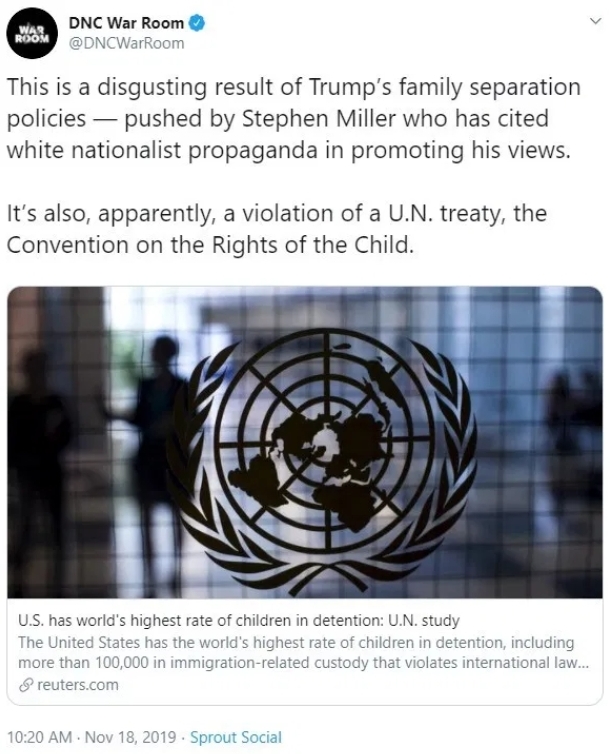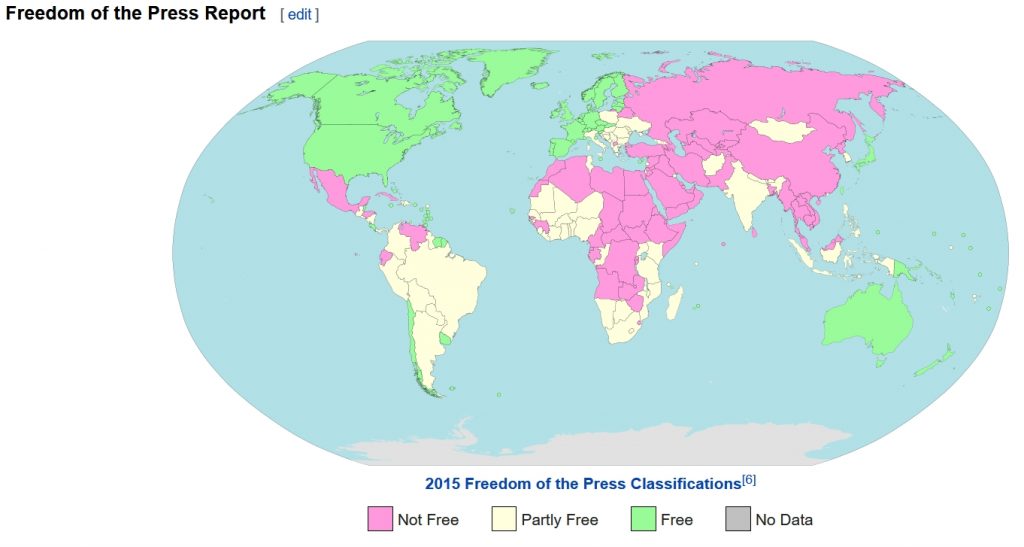On Thursday night, Sacha Baron Cohen, known for his movie roles Ali G, Borat, and that French guy from Talladega Nights delivered a speech at the Anti-Defamation League summit. The speech was essentially about keeping hate, bigotry, and intolerance off social media. A noble cause indeed, but also an extremely dangerous one, as it teeters on that increasingly thin line between social justice, and authoritarian censorship.
In this speech he speaks of the dangers of unregulated free speech on social media, even going so far as to make the hyperbolic statement: “all this hate and violence is being facilitated by a handful of internet companies that amount to the greatest propaganda machine in history.” He goes on to specifically point the finger at the fact that Alex Jones and Breitbart are allowed to have a platform as proof of this “propaganda”. Never mind the fact that Alex Jones has literally been banned off every major social media platform, including Facebook, YouTube, and Twitter. Let’s not let inconvenient facts get in the way of our virtuous speech about banning things.
He somewhat predictably never mentions any sources of propaganda, outside of the two common low-hanging fruits of the right-wing, which somewhat hurts the sincerity of his message. It’s not terribly hard to find examples of propaganda on both sides of the aisle, unless of course you’re of the delusional mindset that propaganda only exists on the “other side”, which might in fact be the case with Mr Baron Cohen.
For example, It was a mere 4 days ago that the United Nations released a report claiming that the US currently has 100,000 kids in detention centers. As it turns out, this figure was actually from 2015, and that number is much lower currently. The UN is an absolute clown car of incompetency, so this gaffe shouldn’t come as much of a surprise. This is the same UN that recently gave Venezuela a seat on their Human Rights Council. The very same Venezuela whose government is currently involved in the routine torture and execution of its own citizens via death squads. Good job, the United Nations.
Regardless, numerous news agencies decided to parrot this statistic from a traditionally dubious source, including Reuters, NPR, APF News, NBC, Al Jezeera, the New York Times, and the Associated Press. Once it was revealed that this statistic wasn’t an indictment of [current President], and was in fact bad P.R. for [last President], the walk back of the articles began. We’re not talking about simply correcting the articles, and changing the year in question from 2019 to 2015, but the articles were outright deleted. Why else would these articles be deleted if the information in them was factual, save for a date being off? These are important statistics, regardless of what year they happened in. This is a form of propaganda in action. It’s doesn’t serve to merely inform, but serves to push a particular point of view.
Here’s a slightly more blatant example of this:

This was tweeted out by an affiliate account of “The Democrats”( who retweeted it), an account that has 1.7 million followers. It implies that the 100,000 number from 2015 is the result of Trump, and policies enacted via white supremacy. As you can probably guess, it was quickly deleted after the inconvenient revelation that a Democrat was President during this time. This isn’t the type of messaging a platform merely looking to inform engages in. It’s propaganda.

But hey, publishing and/or erasing articles that potentially serve to rewrite history and push a partisan narrative is definitely not as bad as a guy who peddles conspiracy theories about inter-dimensional lizard people who isn’t even on any mainstream platform.
Sacha goes on make the argument that social media companies should meticulously curate what information ends up on their platforms. This is an exceptionally stupid idea. The arbiter of what is considered fit to publish will always be whomever is at the top of the chain of command. Jack Dorsey has ultimate say over what ends up on Twitter, and Mark Zuckerberg decides what ends up on Facebook.
If Jack Dorsey wants Kamala Harris to win the presidency, surely it would be in his personal best interest to block any news that might be either beneficial to other candidates, or detrimental to Kamala. This is why it’s important that everyone have a platform to have their say, free of any biased curation. This concept goes out the window when you allow (or force) companies to decide what information they allow on their platforms and what information they do not, completely independent of their terms of service. As a matter of fact, Google is currently involved in a lawsuit regarding their unethical promotion/supression of individual candidates during this election cycle. The very same Google whose motto used to be “don’t be evil”.
Mr Baron Cohen, numerous times throughout this speech, brings up the Holocaust and Holocaust deniers. It seems his not-so-subtle beef with Facebook in particular is that they aren’t doing enough to police anti-Semitic content on their platform. The arbiters of what is fit to be published aren’t making the right judgements, i.e. those that Sacha believes in. So if these platforms aren’t policing their content correctly, who exactly does Mr Baron Cohen feel should be the arbiter? The government? What could possibly go wrong there? Should Sacha Baron Cohen himself get to decide what information is allowed on social media and what isn’t?
He goes on to make the king of disingenuous, bad-faith arguments. He states: “Mark Zuckerberg asked where do you draw the line… but here’s what he’s really saying: Removing more of these lies and conspiracies is just too expensive.”
Asking “where do you draw the line” is an honest and valid question. One that doesn’t have a simple, clear-cut answer. For example, Twitter has a notorious reputation for banning satirical accounts. Does Twitter have a problem with satire? No. These accounts don’t violate its terms of service. But people who feel slighted and entitled have a habit of mass flagging accounts that poke fun of “their side” or engage in humor that hits too close to home. These satirical accounts get banned because of the mass flagging, and then the owner of the account has to contact Twitter to get said account reinstated.
Is anyone making the argument that satire should be banned? The people who engage in this mass-flagging obviously believe so. If something offends a bunch of thin-skinned weenies, should it not be allowed to exist? Does society give up it’s freedom of speech because twelve people on Twitter got offended? Surely Sacha Baron Cohen would say no, but here he is, claiming there is no line and that money is somehow the only roadblock here.
All of this is ironic given that Sacha Baron Cohen made his fame off making jokes that were rooted in the topics of hatred, and bigotry. They are obviously jokes, and shouldn’t be treated as anything other than humor, but there was a line of decency that he had to walk with his comedy. Why should it be ok for him to make a career off jokes rooted in bigotry, but not other people?
Well, he essentially qualifies himself to make these kinds of jokes by explaining that he marched against fascism as a teenager, and wrote a thesis about the civil rights movement in college. He also makes it clear that the point of his comedy is to call out the hate, bigotry and intolerance that his characters espoused. He’s doing this to separate himself from those other “bad people” who might engage in jokes involving hate and bigotry, who don’t have the same virtuous background that he does.
He goes on to explain how his “Throw The Jew Down the Well” song he sang as Borat is a joke that works because “the audience shared the fact that the depiction of Jews as miserly, is a conspiracy theory originating in the middle ages.” This is of course, completely preposterous and delusional.
It’s doubtful that many people laughed at that Borat segment because of their extensive historical knowledge of antisemitism. That bit was funny because a) jokes involving stereotypes can be funny, b) people in the crowd actually start singing along to this wildly inappropriate song, and c) the song itself is actually funny and catchy in a juvenile way. No historical knowledge is needed to find this bit funny. The average kid seeing this segment in the early 2000’s, myself included, were laughing for completely different reasons than the one Baron Cohen gives. He’s trying to intellectualize away the reason most people found this bit to be funny.
But once again, it’s fine for him to joke about these things, but not others. He’s essentially gate-keeping here. The young kid on social media attempting to make a joke about something taboo will be banned or blocked, while Sacha Baron Cohen is free to continue doing his thing because he has the privilege of power and fame on his side.
Sarah Silverman did the exact same thing. She made her name off making jokes dealing with stereotypes, and racial-tinged humor, only to turn around and disavow that very humor once she was sitting comfortably in her gated community. It’s one thing to simply state you’ve grown out of the type of humor you used to do, but to speak out against others employing that same type of humor is outright entitled. It’s essentially taking advantage of a loophole to get ahead, then fighting to close that very loophole once you’re done taking advantage of it. When people do this in business or politics, it’s rightly called it. It should be called out in entertainment too.
To be fair, I think the problem with both Sarah and Sacha is that they existed as individuals at one point in their careers, only to become part of a collectivist monolith once they “made it” in Hollywood. When you exist as an individual, you answer only to yourself, whereas when you’re part of a collective, you answer to the monolith. If a person is surround by a group who all think in a uniform manner, that person is more likely to adopt those group views for fear of standing out or not being accepted within that group. It’s similar to how a cult operates, except in these cases, the individual is willingly conforming out of some need to fit in.
The ADL video is 24 minutes long, and not terribly profound. He pretty much makes the argument that social media should be heavily regulated to police harmful wrong-think. As is to be expected, the video was praised by some of the more authoritarian-minded, big-government types on twitter, and criticized by most of the free speech crowd. In a final act of complete irony, the comments are disabled under the YouTube video. Wouldn’t want anyone to voice a dissenting opinions about censorship, now would we? How very China-esque.
He also says this near the end as his pièce de résistance (How fancy):
“Maybe it’s time to tell Mark Zuckerberg and the CEOs of these companies, you already allowed one foreign power to interfere in our elections, you already facilitated one genocide in Myanmar. Do it again and you go to jail.”
Let’s use government force to imprison owners of social media companies for not removing things I personally disagree with, is a hell of a stance to take. Especially for somebody who starred in a movie about a satirical dictator.
He makes a few salient points here however. Kind of.
The “interference” he’s talking about here was essentially Russia creating accounts and running ads to create division within the U.S. These ads and accounts were all over the political spectrum ranging from pro and anti-Trump, to pro and anti-Clinton, to Black LivesMatter and various religious groups. This activity had apparently been going on as far back as 2014.
This meddling is not to be confused with the “Russian collusion” conspiracy theory that tried to prove Trump collaborated with Russia to swing the election. The same conspiracy theory that is also to blame for every leftist boomer on social media now calling anyone they disagree with online a “bot”, and the current delightful boomer trend of referring to Bernie Sanders and Tulsi Gabbard as “Russian assets”.
I’m not completely sure how Facebook could have known Russians were buying these ads, as opposed to US citizens, but if there was in fact a way for them to tell, they definitely should be held accountable. I also view this interference as a scapegoat for people’s political disappointments however. Americans have a tendency to be pathetically tribalist with their views to begin with, and this division existed without any sort of meddling to begin with. It’s like complaining that someone threw a lit match into your house that was already engulfed in flames. I’m not sure how much effect these ads even had to begin with. They seemed to merely be background noise, and not the existential threat to Democracy they’re being propped up as.
As far as the Myanmar statement goes, he has a somewhat stronger point. The Myanmar government had military personnel who were tasked with spreading anti-Rohingya muslim propaganda on Facebook. This was accomplished via posts from fake accounts under fake names, often on innocuous pages about entertainment. Many of these posts were aimed at swaying public opinion of the minority group, allowing the government to get away with atrocities against that group. This is something that seemingly would have violated Facebook’s T.O.S., and these accounts should have been deleted far earlier than they ultimately were.
To summarize, the actual decent points Sacha makes all involve Facebook’s incompetence in running their platform. Facebook should be held accountable for the poor management of their platform. However, this does not mean we need an online version of the TSA policing every corner of the internet, deleting everything that could be perceived as wrong-think. This is precisely the type of thing that commonly exists in all those human-rights violating countries. You don’t install government-backed powers that get to decide what is allowed to be said, and what isn’t. The inevitable result of this is government suppression of anything critical of that very government.
Virtue-based censorship is still censorship, and it’s dangerous. “We need to start limiting society’s freedom of speech because some infinitesimal percent are using that freedom to say bad things” is not a great argument. A company has the right to decide what is allowed on their platforms and what isn’t. A company is allowed to engage in this type of censorship. The government isn’t. The first amendment prevents this. You can hold individual companies accountable, without endowing the government with even more oppressive means of enacting censorship.

The pink areas on this map represent countries with governments who engage in censorship of press, i.e. the written (or typed) word. The United States, you’ll notice, is green. Sacha Baron Cohen would like it to be pink. Don’t be a Sacha Baron Cohen.

